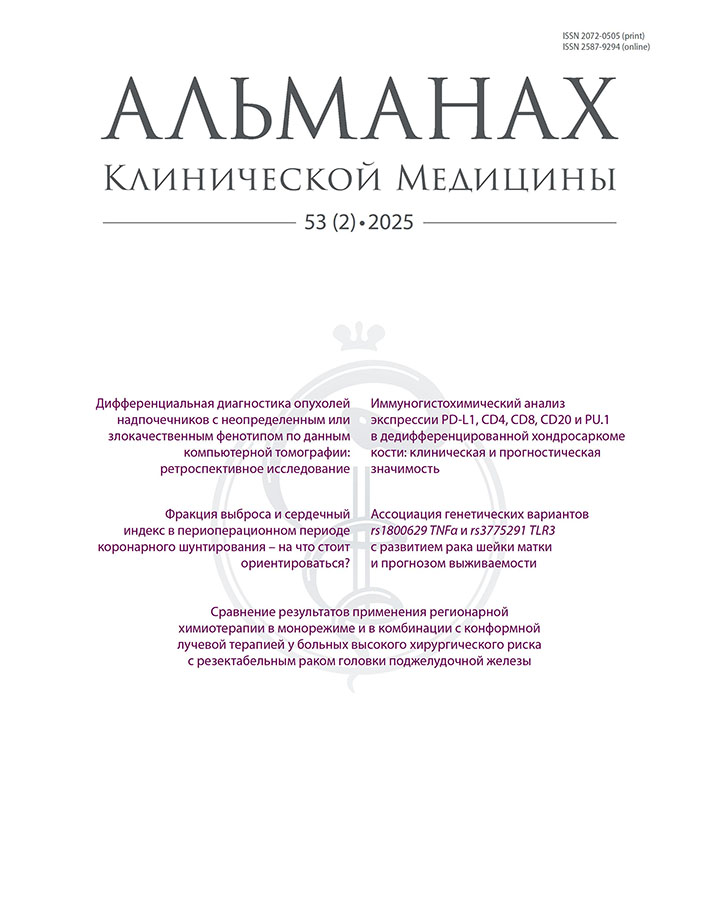КЛИНИЧЕСКОЕ ЗНАЧЕНИЕ ОПРЕДЕЛЕНИЯ СЫВОРОТОЧНОГО И МОЧЕВОГО ПОКАЗАТЕЛЕЙ БЕЛКА ТЕПЛОВОГО ШОКА-70 У БОЛЬНЫХ ХРОНИЧЕСКИМ ГЛОМЕРУЛОНЕФРИТОМ
- Авторы: Чеботарева Н.В.1, Бобкова И.Н.1, Непринцева Н.И.1, Козловская Л.В.1
-
Учреждения:
- ГБОУ ВПО Первый Московский государственный медицинский университет им. И.М. Сеченова
- Выпуск: № 30 (2014)
- Страницы: 18-24
- Раздел: АКТУАЛЬНЫЕ ВОПРОСЫ НЕФРОЛОГИИ
- URL: https://almclinmed.ru/jour/article/view/284
- DOI: https://doi.org/10.18786/2072-0505-2014-30-18-24
- ID: 284
Цитировать
Полный текст
Аннотация
Уровни белка теплового шока-70 в моче и антител к белку теплового шока-70 в сыворотке крови были оценены у 79 больных с различными вариантами течения хронического гломерулонефрита. Изученные показатели были выше у больных с активным течением этого заболевания - выраженным мочевым и нефротическим синдромами, особенно при сочетании с преходящим нарушением функции почек, что отражает степень повреждения и активации механизмов самозащиты почки. Снижение уровня антител к белку теплового шока-70 в сыворотке крови являлось неблагоприятным прогностическим фактором персистирования нефротического синдрома, несмотря на проводимую иммуносупрессивную терапию.
Ключевые слова
хронический гломерулонефрит, chronic glomerulonephritis, нефротический синдром, nephrotic syndrome, самозащита почки, kidney self-defense, белок теплового шока-70, антитела к белку теплового шока-70, экскреция белка теплового шока-70 с мочой, heat shock protein 70 urinary excretion, heat shock protein 70, heat shock protein 70 antibody
Об авторах
Н. В. Чеботарева
ГБОУ ВПО Первый Московский государственный медицинский университет им. И.М. Сеченова
Автор, ответственный за переписку.
Email: fake@neicon.ru
Россия
И. Н. Бобкова
ГБОУ ВПО Первый Московский государственный медицинский университет им. И.М. Сеченова
Email: fake@neicon.ru
Россия
Н. И. Непринцева
ГБОУ ВПО Первый Московский государственный медицинский университет им. И.М. Сеченова
Email: fake@neicon.ru
Россия
Л. В. Козловская
ГБОУ ВПО Первый Московский государственный медицинский университет им. И.М. Сеченова
Email: fake@neicon.ru
Россия
Список литературы
- Мухин H.A., Ляшко В.Н., Маргулис Б.А. и др. Амилоидоз и антитела к белкам теплового шока//Тер. арх. 1992. №64. С.79-82.
- Anderton S.M., van der Zee R., Prakken В. et al. Activation of T cells recognizing self 60-kDa heat shock protein can protect against experimental arthritis//J. Exp. Med. 1995. V.181. P.943-952.
- Basu S., Binder R., Suto R. et al. Necrotic, but not apoptotic cell death releases heat shock proteins, with deliver a partial maturation signal to dendritic cells and activate the NFkB pathway//Int. Immunol. 2000. V.12. P.1539-1546.
- Beck F.-X., Neuhofer W., Muller E. Molecular chaperones in the kidney: distribution, putative roles and regulation//Am. J. Physiol. Renal. Physiol. 2000. V.279. P.203-215.
- Cowley B.D., Gudapaty S. Temporal alterations in regional gene expression after nephrotoxic renal injury//J. Lab. Clin. Med. 1995. V.125. P.187-199.
- de Kleer I.M., Wedderburn L.R., Taams L.S. et al. CD4+CD25 bright regulatory T cells actively regulate inflammation in the joints of patients with the remitting form of juvenile idiopathic arthritis//J. Immunol. 2004. V.172. P.6435-6443.
- Detanico T., Rodrigues L., Sabritto A.C. et al. Mycobacterial heat shock protein 70 induces interleukin-10 production: immunomodulation of synovial cell cytokine profile and dendritic cell maturation//Clin. Exp. Immunol. 2004. V.135. P.336-342.
- Dinda A.K., Mathur M., Guleria S. et al. Heat shock protein (HSP) expression and proliferation of tubular cells in end stage renal disease with and without haemodialysis//Nephrol. Dial. Transplant. 1998. V.13. P.99-105.
- Dulin E., Barreno P.G., Guisasola M.C. Extracellular heat shock protein 70 (HSPA1A) and classical vascular risk factors in a general population//Cell Stress Chaperones. 2010. V.15. P.929-937.
- Kitamura M., Fine L.G. The concept of glomerular self-defense//Kidney Int. 1999. V.55. P.1639-1671.
- Komatsuda A., Wakui H., Imai H. et al. Renal localization of the constitutive 73-kDa heat shock protein in normal and PAN rats//Kidney Int. 1992. V.41. P.1204-1212.
- Marzec L., Zdrojewski Z., Liberek T. et al. Expression of Hsp 72 protein in chronic kidney disease patients//Scand. J. Urol. Nephrol. 2009. V.43, No.5. P.400-408.
- Miyata M., Sato H., Sato Y. et al. Significance of endogenous heat shock protein in adjuvant arthritis//J. Rheumatol. 1999. V.26. P.2210-2214.
- Mueller T., Bidmon B., Pichler P. et al. Urinary heat shock protein-72 excretion in clinical and experimental renal ischemia//Pediatr. Nephrol. 2003. V.18. P.97-99.
- Multhoff G., Hightower L.E. Cell surface expression of heat shock proteins and the immune response//Cell Stress Chaperones. 1996. V.l. P.167-176.
- Rao D.V., Watson К., Jones G.L. Age-related attenuation in the expression of the major heat shock proteins in human peripheral lymphocytes//Mech. Ageing Dev. 1999. V.107. P.105-118.
- van Eden W., Tholet J.E.R., van der Zee R. et al. Cloning of the mycobacterial epitope recognized by T lymphocyte in adjuvant arthritis//Nature. 1988. V.331. P.171-173.
- van Eden W., van der Zee R., Prakken B. Heat shock proteins induce T cell regulation of chronic inflammation//Nature. 2005. V.5. P.318-330.
- Venkataseshan V.S., Marquet E. Heat shock protein 72/73 in normal and diseased kidneys//Nephron. 1996. V.73. P.442-449.
- Welch W.J. Mammalian stress response: Cell physiology, structure/function of stress proteins, and implication for medicine and disease//Physiol. Rev. 1992. V.72. P.1063-1081.
- Wendling U., Paul Lvan der Zee R. et al. A conserved mycobacterial heat shock protein (hsp) 70 sequence prevents adjuvant arthritis upon nasal administration and induced IL-10-producing T cells that cross-react with the mammalian self-hsp70 homologue//J. Immunol. 2000. V.164. P.2711-2717.
- Wu T., Tanguay R.M. Antibodies against heat shock proteins in environmental stresses and diseases: friend or foe?//Cell Stress Chaperones. 2006. V.ll, No.l. P.l-12.
- Zhang X., Xu Z., Zhou L. et al. Plasma levels of Hsp 70 and anti-Hsp70 antibody predict risk of coronary syndrome//Cell Stress Chaperones. 2010. V.15. P.675-686.
Дополнительные файлы








